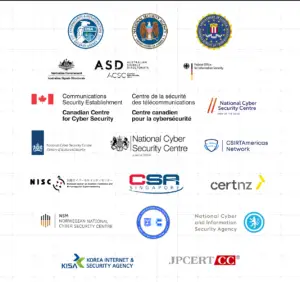QuSmart.AI: Our Approach to Secure by Design
At QuSmart.AI, security isn’t just a feature—it’s the foundation of everything we build. Our AI-driven solutions are designed with a comprehensive Secure by Design approach, ensuring that security is embedded into every aspect of our products from the very start. By adhering to the latest cybersecurity best practices, including memory-safe programming, we provide customers with the highest level of data protection and confidence in a rapidly evolving threat landscape.
Our QuSmart.AI solutions and products lead by example, fully embracing Secure by Design principles to guarantee that your data is safeguarded against even the most sophisticated cyber threats.
Key Elements of QuSmart.AI’s Secure by Design Approach
1. Taking Ownership of Customer Security Outcomes
We believe security should be effortless for our customers. That’s why QuSmart.AI takes full ownership of securing your data, ensuring it is protected by default—out of the box.
- Unique, Non-Repeating Keys: Our AI engine generates one-time pad encryption keys that are never reused, ensuring perfect secrecy and eliminating vulnerabilities related to key reuse.
- Key Length Matching: Our system automatically ensures that encryption keys are always as long as or longer than the message, offering enhanced protection against brute force and other types of attacks.
By automating critical security functions, we minimize user involvement and the potential for human error. At QuSmart.AI, we don’t just meet security standards—we surpass them, guaranteeing robust protection every time you use our products.
 2. Radical Transparency and Accountability
2. Radical Transparency and Accountability
Transparency builds trust, and at QuSmart.AI, we ensure our customers can see and verify the security built into our products.
- High Entropy and Randomness: Our AI engine delivers consistently high entropy, generating encryption keys with near-maximum Shannon entropy, ensuring unpredictability and security.
- Tested and Proven: QuSmart.AI continuously tests our encryption systems, and we openly share results to demonstrate that our keys are random, unique, and meet the highest industry standards.
By embracing transparency, we provide our customers with the assurance that their data is in safe hands, protected by world-class encryption.
3. Secure by Default: Out-of-the-Box Protection
QuSmart.AI takes the guesswork out of security. Our encryption systems are fully Secure by Default, requiring no additional configuration to ensure your data is protected from the start.
- Automated Key Management: With QuSmart.AI, encryption keys are generated, managed, and applied automatically, ensuring that you benefit from perfect secrecy without needing specialized knowledge or manual setup.
- Out-of-the-Box Security: From the moment you deploy our products, they’re equipped to safeguard your data without the need for additional settings or configurations.
Our Secure by Default approach ensures that every user benefits from advanced encryption technology, without the risk of configuration mistakes that can leave systems vulnerable.
 4. Memory-Safe Languages and Memory-Safe Coding
4. Memory-Safe Languages and Memory-Safe Coding
At QuSmart.AI, we take Secure by Design principles one step further by building our products with memory-safe programming languages and secure coding practices. This significantly reduces the risk of memory-related vulnerabilities, one of the most common attack vectors in cyberattacks.
- Memory-Safe Development: Our QuSmart.AI solutions and products are built using Rust, a leading memory-safe language.
- NSA’s Recommendation: The National Security Agency (NSA) has highlighted the importance of memory-safe programming languages in its cybersecurity strategy. The NSA recommends using these languages to develop critical infrastructure and security-sensitive software, reducing the number and severity of security vulnerabilities.
By adopting memory-safe languages, QuSmart.AI eliminates a major class of vulnerabilities and builds products that are inherently more secure. This proactive approach to software development means that our products protect against not only current threats but also future attack vectors.
5. Leading in the Secure Software Development Lifecycle
Security isn’t an afterthought—it’s embedded into every phase of our product development lifecycle. At QuSmart.AI, we follow industry-leading practices to ensure that our software remains secure throughout its lifecycle.
- Quantum Entanglement Simulation Randomness: Our AI engine utilizes quantum entanglement simulation algorithms to create non-deterministic, high-entropy keys, ensuring a level of encryption randomness that goes beyond traditional methods.
- Future-Ready Security: By incorporating memory-safe coding practices, as recommended by the NSA, and ensuring that our encryption techniques are resilient against emerging threats, QuSmart.AI leads the industry in developing security-focused products that are built to last.
Leading the Way in Secure by Design
At QuSmart.AI, our commitment to security is evident in every product we create. By embracing Secure by Design principles, using memory-safe languages like Rust, and adopting quantum entanglement-simulated encryption methods, we provide customers with the confidence that their data is fully protected—without compromise.
Our Secure by Design approach means that from the moment you start using our products, they are ready to secure your most valuable information. Whether you’re protecting sensitive communications or encrypting large-scale datasets, QuSmart.AI ensures that your data remains secure—automatically, transparently, and out of the box.
With QuSmart.AI, security isn’t just a feature—it’s the core of everything we do. Welcome to the future of secure encryption. Welcome to QuSmart.AI.
Resources:
 Learn more about SHIFTING THE BALANCE OF CYBERSECURITY RISK: PRINCIPLES AND APPROACHES FOR SECURE BY DESIGN SOFTWARE signed by the top international cyber security agencies.
Learn more about SHIFTING THE BALANCE OF CYBERSECURITY RISK: PRINCIPLES AND APPROACHES FOR SECURE BY DESIGN SOFTWARE signed by the top international cyber security agencies.
QuSmart.AI is a women-founded Quantum Security company with patent pending technology for perfect secrecy solutions.